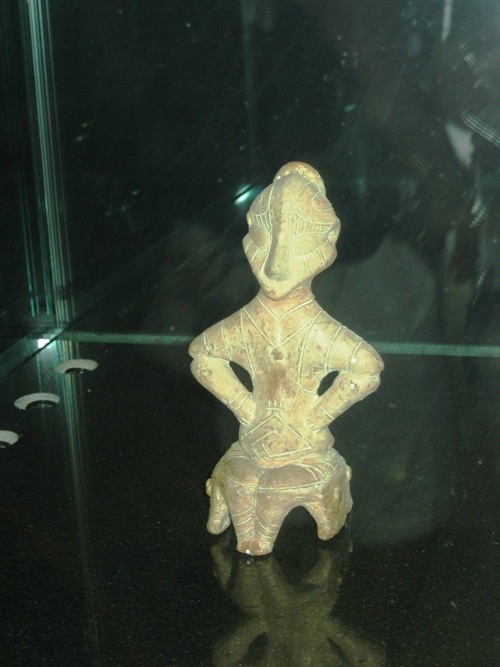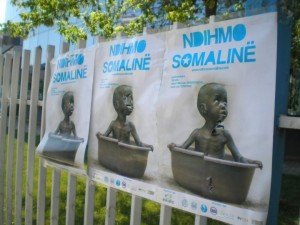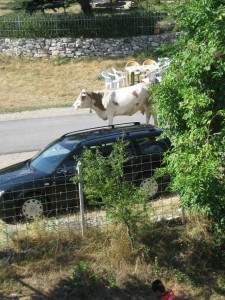Posters of the “Help Somalia!” (Ndihmo Somalinë) campaign have flooded the streets of hot August Prishtina. Young Kosovan volunteers dressed in chic white t-shirts with printed campaign logos, in temperatures well above 30° Celsius, collect donations for a remote African country. Citizens of a region that from the point of view of general public is still perceived as a destination of humanitarian help in Europe are mobilizing their forces to help another country. Reason to smile or to consider – is Kosovo really in such a predicament as the media unceasingly present it? Can it afford to help others when the whole Europe lives with the knowledge of economic and political instability of Kosovo?
The youngest country in Europe is in its third year of independence and apart from diplomatic and military tourism, thanks to the recent customs crisis, it can also enjoy business tourism. Summer heats in this environmentally exceptionally interesting region have been challenging for the fancy official visits from different (especially regional countries) in the last few weeks.
Economic Battle of Kosovo
In this stage, the effort of Kosovan and foreign delegations is more directed to fill the void in the home market after the Serbian production was reciprocally “banished”. Effect is to be seen already after one visit of a local minimarket where there’s no shortage of merchandise from other countries. For example; Coca-Cola was imported from Bulgaria, non-carbonated drinks from Germany or Macedonia, toiletries are provided by Croatia or Czech Republic and of course, local production isn’t missing either. Serbian bar code is more of an isolated case, although company “Pionir” enjoys popularity for their sweets.
At a time when Europe is on the verge of another economic crisis, withal some countries of European Union (EU) are still struggling with the first, as if the Kosovo-Serbian custom crisis fell from the sky to a broad-spectrum business environment. Which means for those who are willing to seize the opportunity. Underestimating a business partner facilitates access to other entrepreneurs waiting in line for their opportunity. Prishtina in particular is a main stage where the „who with whom and against whom“ tragicomedy is taking place. Regional stereotypes, which are the main theme of this centuries old and successful „play“, could become a major obstacle even for experienced businessmen. Although successful in their own country, they are for various reasons, unable to recognize the opportunity and capitalize on the knowledge of local mentality and culture. This can be a great advantage in the Balkans, because it allows at least a partial generalization.
„Kosovan embargo“ as Belgrade entitled the retaliatory step of Prishtina, is not only a single-spectrum invitation for business of the eager. In addition to acute demand for Kosovo’s current consumer goods, Kosovo also offers additional opportunities for business development. Especially in the fields of ecology and environmental sciences that are so in in recent years. It shows in different local associations and NGOs that aim to popularize some regions, whether it’s by international youth projects, or offers of eco- or cycle-tourism, or organizing eco-schooling in interesting environment of Novobrdo fortress.
Authentic ethnographic museum in the Balkans

Statue from Prishtina museum – it was discovered during archaeological excavations near the capital and became the symbol of the International seminar of the Albanian language, literature and culture.
Exhibition of EU on a small-scale?
Despite functioning of independent state institutions, Kosovo is officially still under the supervision of the EU. The community of the old continent has a noticeable interest in admission of the Republic of Kosovo to the „European family“. This is also confirmed by the efforts of Brussels concerning the stability in the country and the region and the active assistance of European institutions in establishing a functioning state. In this sense, the EU advisors are an essential part of the process of creating statutory documents and laws of the country. Ultimately, we are therefore witnesses of particularly interesting situation where Europe’s youngest country has the potential and suitable conditions to become „more catholic than the Pope.“ Despite the fact that Kosovo has almost no real prospects for early EU membership. However, this does not prevent the country to already use EURO as official currency, the obligation to use child car seats for person under the age of 12, and recently ban smoking in establishments and restaurants.
It could be argued that the paper form of laws is one thing, and their application a whole another thing. However, if we take a closer look at the collapsing economic system of the community, which in its beginning prided itself with the adjective “economic”, it appears that even the very founding countries have found ways to circumvent their own rules.
Unity is strength or diversity – the key to success?
Kosovo is a reality, it functions and it’s gaining strength. Due to historical and social processes, this area will probably never reach the Western Europe type of capitalism that paved the way for the development of democracy today. Due to inconsistent interpretation of what democracy and its key elements are, as well as (im)possibility to compare this theory with current practice of various countries (even within Europe), it is misleading to evaluate a state as undemocratic. In particular, if there’s an absence of a reliable source of facts in the form of wide-aspect, detailed research and case studies.
We must not forget the regional specificities in different parts of the territorially monolithic old continent, which in case of ignorance present a stumbling block in establishing cooperation. Eloquently expressed by Kosovo’s Minister for Integration and European Affairs Vlora Çitaku: at a recent public lecture at the University of Prishtina she said that „Integration should not equal assimilation“ and added that it’s up to Kosovars to demonstrate their potential and benefit for Europe.
Different historical processes and changes in the state, social, economic, political, and last but not least religious establishment are responsible for the extremely attractive variety. Although it is at least formally protected by the idea of multiculturalism, this diversity is periodically threatened by extinction due to efforts to enforce uniformity, regardless of the specifics and characteristic attributes of a country or a region. Not to be unfair to the contemporary European system, it is not a novelty. Similar large-scale installation of the same inefficient system for all members without exception is symptomatic of bureaucratic EU, as well as for its union’s predecessor – the Soviet Union.
All that remains is to wait. Forthcoming years will show whether the way that Kosovo set with the assistance of international community will bring individual benefit to this newborn, or will it, in a tangle of power ambitions, be just a toy in the hands of its financial donors.

